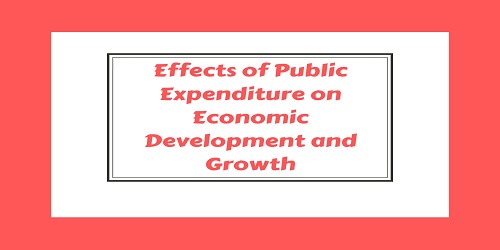Reasons for the Growth of Public Expenditure:
(1) Increase in the Activities of the State- Governments have enlarged the field of services supplied to the consumer free or at less than cost. Education, public health, and public recreation are familiar examples. Housing and medicine are next in the line of advance, and these fields have already been entered. These services are supplied by the government on the theory that a wider consumption that could be financed by the direct beneficiaries is in the public interest.
Governments have increased their expenditure for public works, i.e., railways and roads, etc., in order to relieve distress and to utilize unemployed resources and labor. This type of expenditure is also considered desirable in lifting the country out of depression. In this context, Wagner’s law of increasing the State’s activities is universally true in modern times. “Wagner maintained that there is a persistent tendency both towards an “extensive” and an “intensive” increase in the functions of the State. New functions are continually being undertaken and old functions are being performed more efficiently and on large scale.” Hence more and more public expenditure is restored to perform these activities.
(2) Industrial Development- The Industrial Revolution brought not only a profound industrial but also a political and social transformation in most of the countries of the world. While it centered around changed methods of production made possible by a long series of inventions, political and social factors also contributed their share in the changes ensuing. With the increased output of industry, income, and level of living rose, a larger population could be supported and new wants could be satisfied. New problems in labor relations, the regulation of the industry, the protection of consumers, the distribution of wealth and income, and economic insecurity have arisen and have called for an expansion of government action.
(3) Social Security Measure- Modern governments have taken up the responsibility of protecting the interests of the community as a whole and promoting the implementation of welfare programmes. They have taken up the responsibility to see that fair wages are paid to the workers and sufficient provisions for social security measures are made. Thus, modern governments are spending huge amounts for providing benefits such as old-age pensions, sickness benefits, accident benefits, outright grants, dependent benefits, and free educational and medical services for industrial workers. They have also started schemes of subsidized housing and unemployment benefits. Besides, they are spending large amounts on the provision of medical and health facilities for the entire community. This points out the reasons for the growth of public expenditure.
(4) Nationalization of Industries and Trade- This represents an attempt on the part of the government to provide goods and services on a more or less commercial basis. Governments may undertake such a role to avoid the difficult problem of regulating monopolies or near-monopolies, to provide consumers with goods and services at a reduced cost, or to provide a “yardstick” of private operation. This may also improve the conditions of labor and the distribution of income and wealth. But the payment of compensation, and the setting up and running up of these enterprises, all involve large expenditures. In addition, the government may take over private businesses and trade in order to provide goods at reasonable prices or to make a profit for the treasury.
(5) Development of Agriculture- The development of agriculture seems to hold the key to the progress of the economy as a whole, especially in a developing country like India. The government has realized the linkage between agricultural and non-agricultural sectors. The interaction between agricultural and non-agricultural sectors facilitates the growth of both.
For instance, increased agricultural incomes create market demand for industrial consumption goods, thereby providing a stimulus to industrialization. Thus, there is a close interdependence between agriculture and industry. This release to-
- The supply of raw materials and input from agriculture to industry and vice versa.
- The supply of wage goods to the industrial sector.
- The supply of tools and implements to the agricultural sector.
Thus, a strong foundation of agriculture is a necessary condition for sustained and rapid economic and social development of a country like India. Hence, the governments of developing countries are spending huge amounts on the development of agriculture. They provide loans to cultivators at low rates of interest, give export subsidies, assure minimum guarantee prices, and give tariff protection. They may spend a lot of money on agricultural research, soil conservation programme, etc.
(6) Rising Trend of Prices- Public expenditure has been increasing in every country of the world due to the rising trend of prices. With the advanced price levels, the government has been compelled to pay more for the commodities and services that they desire, and to increase the salaries, and dearness allowance of government employees. This results, in the expansion of public expenditure, although the expansion may not represent more public activity. Some of the increase in public expenditures has been more apparent than real.
(7) Problems of Defence- It goes without saying that one of the major causes for the sharply upward trend of public expenditures has been the problems of defense of the country. If one nation wants to strengthen its defense forces, the others are compelled to take a similar step in sheer self-defense. The manufacture of war weapons and maintenance of the army is a costly matter. The technique of war is a changing phenomenon, and with the changes in the technique of war, new weapons of war are required by the army. This further enhances the burden of public expenditure on the State.
Thus, public expenditure has been on increase due to the increase in defense expenditure in most countries of the world. This term is defined to include all expenditures for recruiting, training, and maintenance of armies, airforce, navies, and conventional and nuclear implements. It includes the offensive and deterrent aspects. However, overall defense costs have accelerated as a result of more sophisticated technology.
(8) Urbanization- Undoubtedly, increased urbanization of the population is an important cause of rising public expenditure. Many cities follow the rule of increasing costs. The per capita cost of water supply, traffic service, and control, public protection, and of health and sanitation rises with the size of the city. Besides, the governments are subject to an additional burden of public expenditures in towns because of the construction and maintenance of hospitals, roads, street lights, playgrounds, community halls, etc., as well as distribution and control of essential commodities of life.
(9) Change in Attitude Towards Government- Undoubtedly some of the increase in public expenditure is due to the general change in attitude towards government. A century ago governments were feared as a source of tyranny and arbitrary power, today the more preponderant view is that a square deal for the common man and a more abundant life for all cannot be achieved without relying heavily upon government. This change in attitude is undoubtedly due to many causes, of which mention may be given to a few which seem especially important.
- Technical changes have increased the feeling of interdependence and the inability of many to work out their own salvation amidst forces many of which are entirely beyond their control.
- The economic system, which may have functioned fairly well as an automatic mechanism when business and production were carried on by small units, now appears to stall badly at times, to be subject to monopoly control, and to lend to the exploitation of many varieties. The result has been a demand upon the government to counteract business depression and keep the economy in balance. Some have urged the government to take responsibility for achieving and maintaining economic stability, but it is possible only through increasing public expenditure.
- Increasing humanitarianism deplores the presence of extensive poverty and approves collective action to alleviate and eliminate it. Here is found a partial explanation of the huge recent increase in outlays for public welfare and public works.
- There has been a feeling that political and economic problems have increased in complexity and that this, among other reasons, warrants a large outlay for educational and other welfare activities, such as medical aid, housing, as well as the police, and home administration.
(10) Economic Development- Public expenditure has been rapidly increasing in underdeveloped countries. Most of these are wedded to programmes of rapid economic development, i.e., the provision of the infrastructure of the economy such as transport, communication, power, etc. It is necessary for the State to provide economic and social over-heads so that industries may develop rapidly. Besides, it is the policy of most modern, governments to help private people in their productive effort by means of bounties, loans, and grant-in-aid to agriculturists and industrialists. Help is also given by providing various types of facilities, i.e., technical and raw material assistance, etc.
Thus the growth of development planning whereby governments garner and allocate scarce resources in different spheres of the economy to raise per-capita incomes well above subsistence levels has been responsible for a vast rise in expenditure on irrigation and infrastructural facilities, apart from industrial ventures.
(11) Growth and Social Justice- The ultimate goal of economic planning, as we envisage, is to establish an egalitarian and prosperous society. Economic development has recently emphasized a rapid rate of growth of the national product to attain this goal. However, experience has shown that growth by itself does not lead to the eradication of poverty. Studies on the process of economic development in several developing nations, where satisfactory rates of growth of the economy have been achieved during the recent past, bear out that growth has not always been able to make any significant impact on employment and poverty. On the contrary, unemployment and inequality have been accentuated.
The experience in India is not different from that of other developing countries. While there has been growth in the economy since planned development started, it has hardly made any effect on the worsening problem of unemployment and poverty. Since growth, both industrial and agricultural, is confined to certain parts of the country and certain classes of people aggravating thereby income inequalities and regional imbalances.
It should, however, be noted that there is no inherent conflict between growth and social justice, provided a policy is also designed to achieve distributive justice. Hence, the governments of developing countries are spending huge amounts in favor of weaker sections of society so as to achieve distributive justice.









Comments (No)